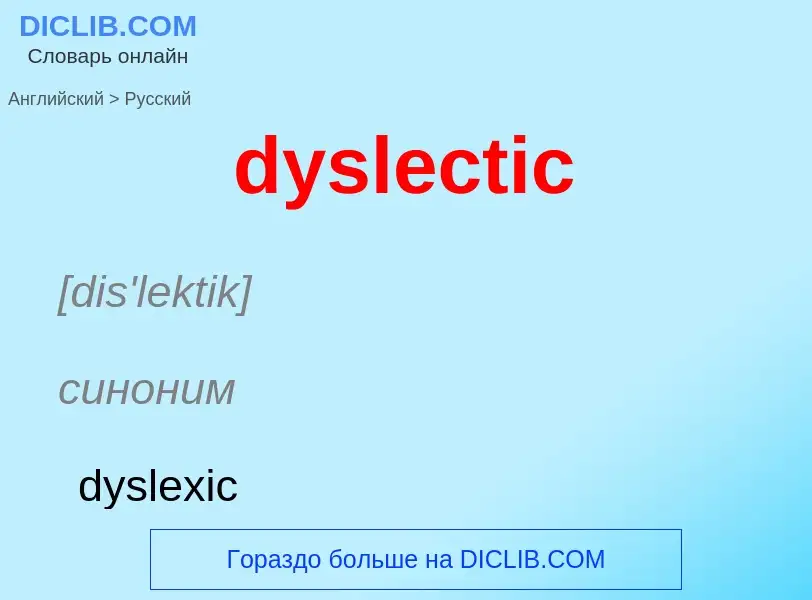Traducción y análisis de palabras por inteligencia artificial
En esta página puede obtener un análisis detallado de una palabra o frase, producido utilizando la mejor tecnología de inteligencia artificial hasta la fecha:
- cómo se usa la palabra
- frecuencia de uso
- se utiliza con más frecuencia en el habla oral o escrita
- opciones de traducción
- ejemplos de uso (varias frases con traducción)
- etimología
dyslectic - traducción al ruso
[dis'lektik]
синоним
Definición
I'm sorry, I'm dylsexic.
Wikipedia

Dyslexia, also known until the 1960s as word blindness, is a disorder characterized by reading below the expected level for one's age. Different people are affected to different degrees. Problems may include difficulties in spelling words, reading quickly, writing words, "sounding out" words in the head, pronouncing words when reading aloud and understanding what one reads. Often these difficulties are first noticed at school. The difficulties are involuntary, and people with this disorder have a normal desire to learn. People with dyslexia have higher rates of attention deficit hyperactivity disorder (ADHD), developmental language disorders, and difficulties with numbers.
Dyslexia is believed to be caused by the interaction of genetic and environmental factors. Some cases run in families. Dyslexia that develops due to a traumatic brain injury, stroke, or dementia is sometimes called "acquired dyslexia" or alexia. The underlying mechanisms of dyslexia result from differences within the brain's language processing. Dyslexia is diagnosed through a series of tests of memory, vision, spelling, and reading skills. Dyslexia is separate from reading difficulties caused by hearing or vision problems or by insufficient teaching or opportunity to learn.
Treatment involves adjusting teaching methods to meet the person's needs. While not curing the underlying problem, it may decrease the degree or impact of symptoms. Treatments targeting vision are not effective. Dyslexia is the most common learning disability and occurs in all areas of the world. It affects 3–7% of the population; however, up to 20% of the general population may have some degree of symptoms. While dyslexia is more often diagnosed in boys, this is partly explained by a self-fulfilling referral bias among teachers and professionals. It has even been suggested that the condition affects men and women equally. Some believe that dyslexia is best considered as a different way of learning, with both benefits and downsides.





